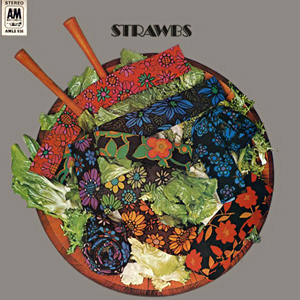Related Research Articles

Just a Collection of Antiques and Curios is the third album by the Strawbs, mostly recorded live at the Queen Elizabeth Hall in London on 11 July 1970. The album reached number 27 in the UK Albums Chart.

Grave New World is the fourth studio album by English band Strawbs, their fifth overall. It was the first album to be released after the departure of Rick Wakeman, who was replaced by Blue Weaver, late of Amen Corner.

Strawbs is the first album released by the English band Strawbs. The Sandy Denny & The Strawbs LP All Our Own Work was recorded earlier, but not released until 1973.
"Benedictus" is a song by English band Strawbs featured on their 1972 album Grave New World.
"Here It Comes" is a song by the English band Strawbs. It did not appear on any of their studio albums, but it was included on two compilation albums: Strawbs by Choice and Halcyon Days. Written by bandleader Dave Cousins, "Here It Comes" shows definite pop influences and a more commercial view to song-writing, a trait that would extend to the next single, "Lay Down".
"Forever" is a song by English band Strawbs written by Dave Cousins and Tony Hooper. It did not feature on any of their studio albums at the time but was included as a bonus track on the CD re-release of the albums Just a Collection of Antiques and Curios and Dragonfly.
"The Man Who Called Himself Jesus" is a song by English band Strawbs written by Dave Cousins. It appears on their first album Strawbs. An alternative mix of the song may be found on the 2006 box set A Taste of Strawbs.
All Our Own Work is an album by Sandy Denny and the Strawbs, recorded in 1967 but not released until 1973. The album was recorded in Copenhagen, Denmark, and contains an early recording of one of Sandy Denny's best known songs "Who Knows Where the Time Goes?". Denny later recorded this song as a member of Fairport Convention. The album was released by Pickwick Records, who in the 1970s specialised in budget releases of deleted record company catalogues.
Ronald George Arthur Chesterman was an English musician. He is best known as the original double bass player with the Strawberry Hills Boys, starring Dave Cousins on guitar, dulcimer, banjo and vocals, Tony Hooper on guitar and vocals and Ron himself on double bass. They kept that name from 1964 when they formed until June 1967, when they were giving a concert and needed to put the name of the band on stage, so they became The Strawbs. Later, after he left the band, he became a county archivist in Chester.

A Taste of Strawbs is a box-set album by Strawbs. Instead of being a "best of" album, the compilers have attempted to present alternative versions of some well-known songs plus some previously unreleased material. Included are some very old songs by The Strawberry Hill Boys, with Dave Cousins, Tony Hooper and Ron Chesterman, also are some very interesting songs by Sandy Denny and The Strawbs, and outtakes from different periods of the band's career.

"Shine on Silver Sun" is a song by English band Strawbs featured on their 1974 album Hero and Heroine. It is written by Dave Cousins and was intended as a "come-back" single after the post-"Part of the Union" band split. The single was a minor success peaking at number 34 in the UK Singles Chart.

The Very Best of the Strawbs: Halcyon Days is a compilation album by English band Strawbs. Although credited to Strawbs it does contain three Hudson Ford tracks and a Dave Cousins solo track. The album was released as a 2-CD set in the UK and US. The US release has a slightly different title and a different track listing.

The Complete Strawbs is a live album by English band Strawbs. It was recorded in 1998, at their 30th anniversary concert at Chiswick House. The concert was also filmed and later was released on DVD. More than four different incarnations of the band performed. Wherever possible, the tracks were performed by the original musicians, although there were exceptions. Keyboard players John Hawken, Andy Richards and Rick Wakeman were unable to attend, but Wakeman's son Adam deputised for them. Original bass player Ron Chesterman and one-time drummer Tony Fernandez were present at the concert but did not perform.

The Collection is a compilation album by English band Strawbs.

Painted Sky is a live album by Acoustic Strawbs.
"Hero and Heroine" is a song by English band Strawbs featured on their 1974 album of the same name. It is written by Dave Cousins. The song is in a similar vein to an earlier track "Witchwood" but with rather more obvious allegory.
"Queen of Dreams" is a song performed by English band Strawbs and written by Dave Cousins. The track first appeared on the 1972 Grave New World album.
"New World" is a song by English band Strawbs written by Dave Cousins. The track first appeared on the Grave New World album.
"The Flower and the Young Man" is a song by English band Strawbs written by Dave Cousins. The track first appeared on the Grave New World album.
"Tomorrow" is a song by English band Strawbs credited as a band composition with the main idea by Dave Cousins. The track first appeared on the Grave New World album.